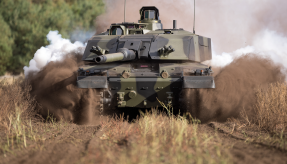
Ongoing geopolitical instability has brought many demand-side pressures for defence industry manufacturers, requiring greater focus on supply chain resilience. Working collaboratively not only helps to mitigate supply chain risks, it also creates a stronger national deterrent says Jill Hewitt Director and defence sector specialist at management consultancy, Vendigital.

Jill Hewitt
The Covid-19 pandemic, followed by increased demand due to the Ukraine conflict, revealed challenges in Defence supply chains. National stockpiles were eroded and the 30-day contingency policies applied by many national jurisdictions proved inadequate, leading to an urgent need for increased international collaboration.
As governments moved to replenish stocks, demand pressures and industry priorities began to shift. The cost reduction imperative during bidding processes is giving way to a new priority – resilience – and with defence interests converging, UK manufacturers are taking a different approach. Instead of competing to ringfence critical supplies, they are seeking to collaborate internationally with a view to strengthening the UK’s industrial base.
A new era of collaboration
In 2023, the UK’s defence turnover was £28 billion, with exports accounting for about 30 per cent of this figure. This underlines how important international trade and supply relationships have become. At Eurosatory 2024, many countries and large defence organisations, were initiating conversations more than ever before, recognising that in today’s climate of increased geopolitical instability, industrial robustness is a key deterrent.
A number of defence organisations, supported by the key customer, are working towards proactively identifying unified demand signals and sharing enhanced end-to-end supply chain visibility. This means that building the ‘digital thread’ beyond organisational borders is critical and is creating an unprecedented drive to advance digital capabilities, which had largely stalled since Covid.
Supply Chain Digital threads rely on foundational datasets such as Enterprise Resource Planning systems, [ERP], product lifecycle management tools, manufacturing and end-product digital twins. The challenge of aggregating this mass of highly variable data from either current or legacy systems is currently being solved through first-order data analytics, which is predominantly used to identify anomalies and build actionable insights across complex supply chains. Whilst these outcomes are valuable, the industry’s key driver is to establish the core dataset that can be used for closed (not open) AI interrogation moving forward. Robust toolsets are now in use to supplement core datasets with emails, images, meeting notes, shopfloor manuals, delivery notes, workforce skillsets and availability, compliance and safety case requirements. It is this next step that will insure organisations against risk, by providing enterprise modelling capabilities (enterprise digital twin) and deliver sufficient supply chain data to maintain and flex supply to best value and best effect.
Embracing digital thread
To take advantage of the big data opportunity, defence organisations must overcome resourcing constraints and embrace ‘digital thread’ and the golden digital threads that could exist between organisations. With 18,000 apprenticeships already up and running in the UK in 2023, the industry is building its capabilities. However, the skillsets required are in short supply and high demand, especially in areas such as Data Science. Increasingly, Defence organisations are looking externally to trusted and experienced partners to deliver capability through SQEP (Suitably Qualified and Experienced Persons) as part of their digital transformation journey.
Traditional imperatives such as reducing cost and freeing up capital are still the main tenants of pressure for the UK’s defence industry. The added pressures of increasing output and productivity at the same time as funding digital transformations are a major challenge for many C Suites. Inventory is often overlooked at times of full order books and yet with so much focus on advancing innovation, obsolescence and slow-moving stock have become significant sinkholes for working capital. Not only is there a capital cost to organisations, there is also a cost to carry legacy datasets as these undoubtedly introduce lag and risk into digital transformation. Pre-transformation data hygiene checks are invaluable but rarely performed. Archiving is an afterthought. The past poor data hygiene caused slow report run-times. As of now, it will severely impact executive decision making.
It’s an exciting time for the defence sector, as ‘digital thread’ is explored and expanded, at home and internationally. The industry is evolving away from traditional corporate practices and working hard to find solutions for problems such as how to coral AI within functional but distinct boundaries. The propagation of data also raises significant challenges to ensure appropriate access and repelling cyber threats. Whilst there is much to do, there is now a route forward – the new digital golden thread is a reality.
If you would like to join our community and read more articles like this then please click here








